第9章 Chapter II. Folkways(2)
When the sun stood overhead, the women would give the welcome call of "Dinner!" Their morning had not been less busy than the men's. They had baked corn cakes on hot stones, roasted bear or pork, or broiled venison steaks; and--above all and first of all --they had concocted the great "stew pie" without which a raising could hardly take place. This was a disputatious mixture of deer, hog, and bear--animals which, in life, would surely have companioned each other as ill! It was made in sufficient quantity to last over for supper when the day's labor was done. At supper the men took their ease on the ground, but with their rifles always in reach. If the cabin just raised by their efforts stood in the Yadkin, within sight of the great mountains the pioneers were one day to cross, perhaps a sudden bird note warning from the lookout, hidden in the brush, would bring the builders with a leap to their feet. It might be only a hunting band of friendly Catawbas that passed, or a lone Cherokee who knew that this was not his hour. If the latter, we can, in imagination, see him look once at the new house on his hunting pasture, slacken rein for a moment in front of the group of families, lift his hand in sign of peace, and silently go his way hillward. As he vanishes into the shadows, the crimson sun, sinking into the unknown wilderness beyond the mountains, pours its last glow on the roof of the cabin and on the group near its walls. With unfelt fingers, subtly, it puts the red touch of the West in the faces of the men--who have just declared, through the building of a cabin, that here is Journey's End and their abiding place.
There were community holidays among these pioneers as well as labor days, especially in the fruit season; and there were flower-picking excursions in the warm spring days. Early in April the service berry bush gleamed starrily along the watercourses, its hardy white blooms defying winter's lingering look. This bush--or tree, indeed, since it is not afraid to rear its slender trunk as high as cherry or crab apple--might well be considered emblematic of the frontier spirit in those regions where the white silence covers the earth for several months and shuts the lonely homesteader in upon himself. From the pioneer time of the Old Southwest to the last frontier of the Far North today, the service berry is cherished alike by white men and Indians; and the red men have woven about it some of their prettiest legends. When June had ripened the tree's blue-black berries, the Back Country folk went out in parties to gather them. Though the service berry was a food staple on the frontier and its gathering a matter of household economy, the folk made their berry-picking jaunt a gala occasion. The women and children with pots and baskets--the young girls vying with each other, under the eyes of the youths, as to who could strip boughs the fastest--plucked gayly while the men, rifles in hand, kept guard.
For these happy summer days were also the red man's scalping days and, at any moment, the chatter of the picnickers might be interrupted by the chilling war whoop. When that sound was heard, the berry pickers raced for the fort. The wild fruits--strawberries, service berries, cherries, plums, crab apples--were, however, too necessary a part of the pioneer's meager diet to be left unplucked out of fear of an Indian attack.
Another day would see the same group out again. The children would keep closer to their mothers, no doubt; and the laughter of the young girls would be more subdued, even if their coquetry lacked nothing of its former effectiveness. Early marriages were the rule in the Back Country and betrothals were frequently plighted at these berry pickings.
As we consider the descriptions of the frontiersman left for us by travelers of his own day, we are not more interested in his battles with wilderness and Indian than in the visible effects of both wilderness and Indian upon him. His countenance and bearing still show the European, but the European greatly altered by savage contact. The red peril, indeed, influenced every side of frontier life. The bands of women and children at the harvestings, the log rollings, and the house raisings, were not there merely to lighten the men's work by their laughter and love-making. It was not safe for them to remain in the cabins, for, to the Indian, the cabin thus boldly thrust upon his immemorial hunting grounds was only a secondary evil; the greater evil was the white man's family, bespeaking the increase of the dreaded palefaces. The Indian peril trained the pioneers to alertness, shaped them as warriors and hunters, suggested the fashion of their dress, knit their families into clans and the clans into a tribe wherein all were of one spirit in the protection of each and all and a unit of hate against their common enemy.
Too often the fields which the pioneer planted with corn were harvested by the Indian with fire. The hardest privations suffered by farmers and stock were due to the settlers having to flee to the forts, leaving to Indian devastation the crops on which their sustenance mainly, depended. Sometimes, fortunately, the warning came in time for the frontiersman to collect his goods and chattels in his wagon and to round up his live stock and drive them safely into the common fortified enclosure. At others, the tap of the "express"--as the herald of Indian danger was called--at night on the windowpane and the low word whispered hastily, ere the "express" ran on to the next abode, meant that the Indians had surprised the outlying cabins of the settlement.